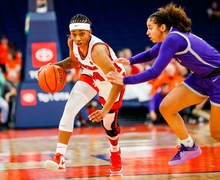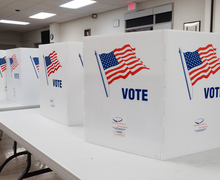Dajuan Coleman’s two seasons of rehab paying off during improbable season
Logan Reidsma | Senior Staff Photographer
Dajuan Coleman has rehabbed for the last two seasons without the opportunity to play. Now he's getting a chance to show his ability in the NCAA Tournament.
HOUSTON — When Dajuan Coleman is on the bench and wants to get in the game, his massive hulking body will shift around in his seat. He’ll elbow assistant coach Adrian Autry, unintentionally of course, who he sits next to on the sideline. He’ll knock his knee against Autry’s.
There’s not much talking for the soft spoken big man — the guy Syracuse coaches thought had a 50 percent chance of playing 10 games this season. There’s little talk of the three hours of rehab each day that it took to get back, or the day-by-day struggle to get acclimated to the game once the rehab was complete.
Coleman just sits on the bench, wanting to be the guy to make the next play.
“A lot of the work I’ve been doing for two years is definitely starting to pay off,” Coleman said. “I’m really excited. I’m here. I can’t take it for granted.”
The production for Coleman this year has been on and off. In the past seven contests, he’s had a game where he played just nine minutes, only to stay on the court for 33 minutes 10 days later. He’s had seven games where he’s scored double-figures, and then five more games where he hasn’t scored a single point.
But after two years of rehabbing a knee injury, the fact that he’s just on the court 36 games into his first full season is as impressive as the run Syracuse has made to keep him playing. He’ll get to continue his improbable season on Saturday in the Final Four, when he starts for Syracuse (23-13, 9-9 Atlantic Coast) against North Carolina (32-6, 14-4) — a team he’s corralled nine offensive boards against in 36 minutes of action over two games — at 8:49 p.m in NRG Stadium.
“His rehabs, it’s not like when adults get hurt and they have to rehab an injury,” Jim Boeheim said. “They go to the guy for 30 minutes, that’s the rehab. He rehabs for three hours a day. He did it every day for two years, summer, spring, fall, winter, without the ability to play in a game.”
Coleman came to Syracuse with the fanfare that would seem appropriate for a five-star talent from just down the road. He was so popular in high school that even North Carolina head coach Roy Williams went on a recruiting visit, hoping he had a chance until he ran into Boeheim there too.
His popularity hasn’t faded in his home city. When he scores or gets on any kind of defensive roll, the Carrier Dome crowd cheers louder for him than they do for anyone.
“I just feed off of that,” Coleman said.

Logan Reidsma | Senior Staff Photographer
He plays a lot less than Tyler Lydon, the NCAA Tournament darling that has 17 blocks in his last three games. But his presence has been important for Syracuse throughout this extended season.
When Coleman got the ball near the top of the key at the outset of the second half in SU’s Elite Eight win over Virginia, he decided that he was the person that had to get something started. Scoring off the dribble isn’t his forte and neither is maneuvering his way around the post.
It wasn’t pretty, and the first attempt resulted in a shot that didn’t hit the rim. But he got his own rebound and was fouled. He “just wanted to start us up again.” It happened minutes into the second half, with Syracuse down by 14 points.
“You see him, he enjoys it every day,” Autry said. “When you have injuries and when basketball gets taken away from you, I think it gives you a perspective. I think he has a different perspective.”
Seated atop the NCAA Tournament podium on Friday afternoon, Boehiem leaned over to his two senior stars. Michael Gbinije and Trevor Cooney are enjoying their last go-round, playing in their final college weekend. Coleman is a senior, too, though that’s often forgotten because he still has another year to play. He’s been a part of all this for four years, but hasn’t had the same chances to build a legacy as Gbinije or Cooney.
Boeheim had just said that if he were in Coleman’s situation, he doubts he would have been able to come back.
“Could you see yourself doing that?” he asked to get their attention.
Gbinije just shook his head. Then Cooney leaned forward in his chair.
“Not the way Dajuan did it, no.”
Thirty-six games later, it’s easy to forget how impressive it is that he’s played in 36 games. It’s easy to move past how impressive it is he’s played at all. He doesn’t have that legacy yet, but he’s establishing one now.
“It’s a great story,” Boeheim said. “It really is.”
Published on April 1, 2016 at 5:38 pm
Contact Sam: sblum@syr.edu | @SamBlum3





